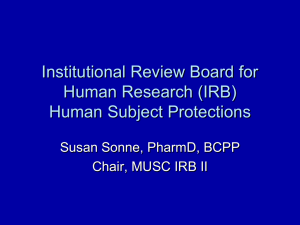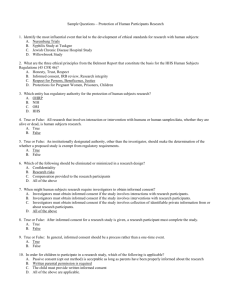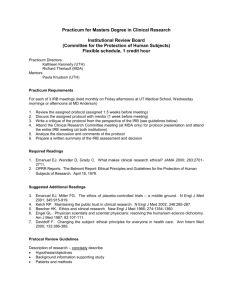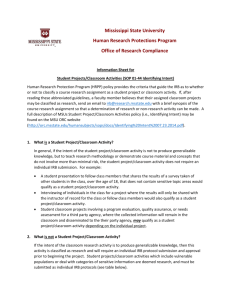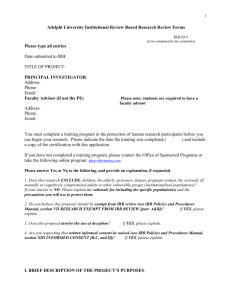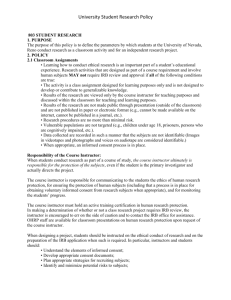Ethical Issues to Consider
advertisement
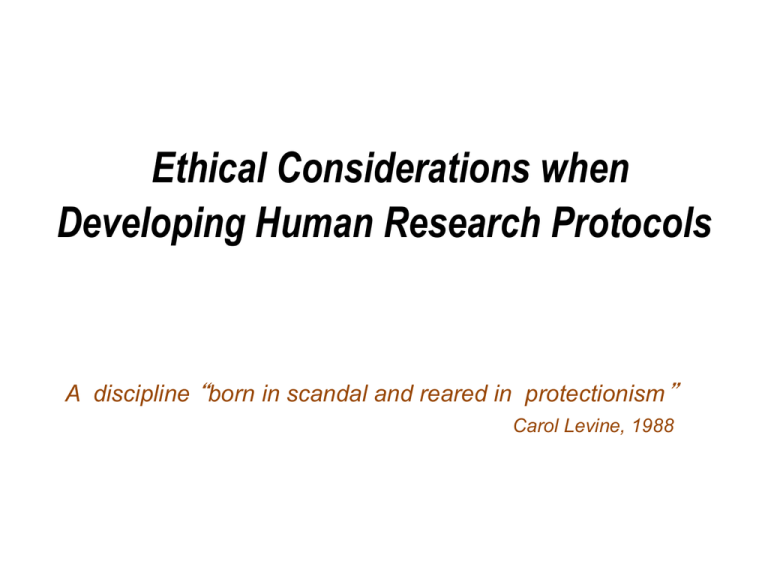
Ethical Considerations when Developing Human Research Protocols A discipline “born in scandal and reared in protectionism” Carol Levine, 1988 Ethical Review of Research I Social Value II Scientific Validity III Respect for Persons IV Fair Subject Selection. V. Favorable Risk-Benefit Ratio VI Independent Review . I. Social Value What is the importance of the information sought in relation to the burden of inconvenience, time, amount of commitment necessary to complete the research? Are the data reliable and useful? collection, handling, monitoring of the integrity and reliability of the data II. Scientific Validity • Data collection: appropriateness of methods to answer the scientific question being addressed; transparency; training/supervision of data collectors • Data integrity discussion questions: responsibilities of investigators and institutions; collegial mentoring vs. mandated training; intellectual property; proprietary data vs. sharing policies; transparency vs. protection of information; cost of sharing • Should all types of research be covered by single set of guidelines or should guidelines differ f/type of research? II. Scientific Validity (contd) • Data management: recording; retention; analysis • Data sharing: reasons to share; data sharing policies; support for sharing; what, how, when to share; compliance • Ownership and access: grants vs. contracts; ownership vs. access; access by collaborators during and after project ends; institutional responsibility • Data reporting: authorship agreements; acknowledgments; institution’s publication policies; funders’ publication policies; confidentialty; disclosure of bias and interests III. Respect for Human Subjects Ethical norms and obligations to subjects for the conduct of research - IRB review Respect for Persons Beneficence Distributive Justice Research Plan must have: -Provisions for monitoring research -Provisions for protecting privacy and confidentiality Informed Consent Principle of Respect for Persons acknowledge and promote autonomy (i.e. selfdetermination) - Consider the nature and definition of informed consent in various research settings. additional protections for individuals with diminished autonomy. -Informed consent is obtained from subject or Legally Authorized Representative -Informed consent is properly documented IV. Fair Subject Selection Initial steps in planning and identifying the research project: •need careful consideration at the outset of the research participants and their situation – i.e. continued compliance (no missed follow ups; no drop outs; etc) • bringing in the participants and keeping them involved. participants have some investment in the outcome of research for a new drug or intervention,. But in behavioral, social science, education, longitudinal studies, participants often do not complete the study and so may weaken the results. IV. Fair Subject Selection (contd) -Equitable Selection of subjects • Principle of Justice – equals ought to be treated equally in the distribution of burden and benefits • fair distribution of scarce benefits • fair distribution of burdens • • • • who will be the subjects? What are good recruitment methods? What is in it for them? How vulnerable are they? V. Favorable Risk : Benefit Ratio Principle of Beneficence minimize possible harms maximize possible benefits - Risks to subjects are minimized i.e. Using procedures already planned for diagnosis or treatment and using procedures consistent with sound scientific design -Risks are reasonable in relation to anticipated benefit and importance of the knowledge reasonably expected Consider the risks and benefit from the research itself, not from what the subject would be exposed to if not a research participant VI. Independent Review Institutional Review Board - established to protect and safeguard the interests, rights and welfare of human subjects Consider: The boundaries between biomedical and behavioral research and the accepted and routine standard practices. Assessment of risk-benefit criteria in the determination of the appropriateness of research involving human subjects. Assess subject recruitment methods Common Rule 45 CFR 46 DoD 32 CFR 219 • Defines RESEARCH – A systematic investigation designed to develop or contribute to generalizable knowledge. • Defines HUMAN SUBJECT – Living individual about whom an investigator conducting research obtains data through intervention or interaction or identifiable private information. • Defines IRB – Institutional Review Board established to protect and safeguard the interests, rights and welfare of human subjects. Role of IRBs • Shared responsibility for ensuring ethical standards among investigators, peers, local community. • Independent assessment of risks and benefits to human subjects. • Reflect values of local community • Work collegially with PIs to safeguard subjects’ rights, safety and welfare. • Additional provisions for vulnerable subjects: Prisoners, Children , Pregnant women and fetuses. What happens at IRB meetings • IRB members receive all the research materials for review in advance. The Chair conducts the meeting from a preset agenda and each submission is open for discussion by IRB Members and Consultants. • PIs or their representatives are invited to present their research and answer questions. • A motion is made for IRB action. Meetings and votes require a quorum of members and the presence of a lay member. • IRB decisions are conveyed to the PI in writing. Expedited Review • Does not mean faster than full Board review. • Conducted by the IRB Chair or designee • Designee exercise all of the authorities of the Board, except disapproval – upgrade to full IRB review if greater than minimal risk. • All Protocol and Consent requirements apply.




